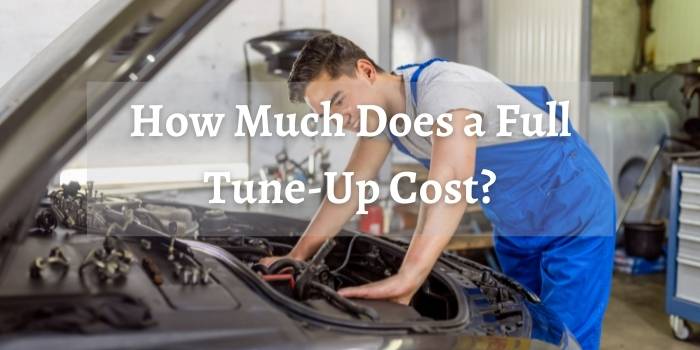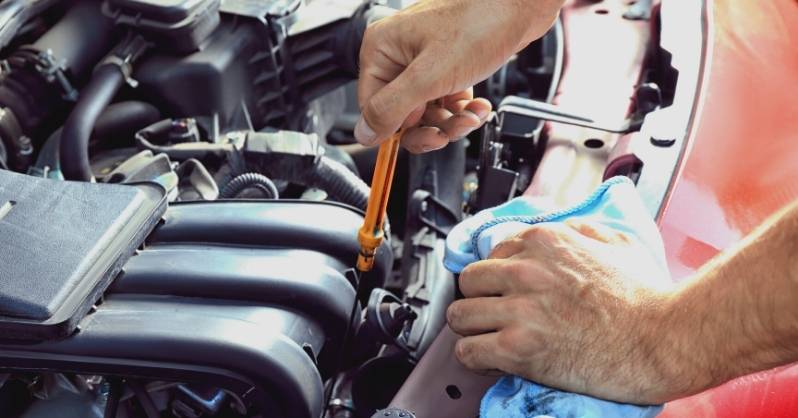Cars are like people in that they need regular check-ups to stay healthy. Just like you wouldn’t go for years without seeing a doctor, your car shouldn’t go too long without a tune-up. But have you ever asked yourself “How much does a full tune up cost?”
On average, a full tune-up costs from $50 to $100, given your vehicle doesn’t have any damaged components. If any component is damaged or broken, you’ll need to pay for their replacement or servicing.
Today, we’ll break down the average cost of tune-ups at both dealerships and independent garages.

What is a Tune-Up?
Most people associate the need for a tune-up with their car’s performance. What is a tune-up? A vehicle tune-up is a scheduled service visit where the engine is serviced and repaired.
The purpose of a tune-up is to prevent major engine problems before they occur. By keeping the engine in good condition, tune-ups can help extend its lifespan and prevent costly repairs down the road.
The frequency of tune-ups varies from car to car, but they are typically needed every 30,000 miles or so.
How Much Does a Tune-Up Cost?
“How much does a tune-up cost?” This is a question that many drivers ask at one point or another. The answer, unfortunately, is not a simple one.
The cost of a tune-up can vary depending on the model of your vehicle, how often you drive, and how well you maintain your car.
Generally speaking, most mechanics recommend a tune-up every 3,000 to 10,000 miles. However, if you drive an older car or one that isn’t well-maintained, you may need to get a tune-up more often.
Tune-ups typically cost between $50 and $100, although the exact price will depend on the steps involved.
For example, if your vehicle doesn’t have any damaged components, then it’ll cost you only the tune-up charge. However, you’ll have to pay extra for each damaged component that requires servicing or replacement.
What Are Some Signs My Car Needs a Tune-Up?

Most carmakers recommend tune-ups every 30,000 to 90,000 miles, although this varies depending on the type of car and engine. However, there are several signs that your car may need a tune-up even before it reaches the recommended mileage.
- If your car is sluggish or hesitant when accelerating,
- If you notice a drop in fuel economy or an increase in engine emissions, these can be signs that your car’s spark plugs or other engine components need to be replaced.
- If you hear strange noises coming from the engine, especially knocking or rattling, this is another sign that it’s time for a tune-up.
- Finally, if the check engine light comes on, this is an indication that there may be an issue with the engine that needs to be addressed.
If you notice any of these signs, it’s best to take your car to a qualified mechanic for a tune-up
What is Done in a Tune-Up?
In this section, we’ll take a look at the services that are generally provided in a tune-up. Let’s get right to it.
Changing the Oil Filter
As part of a car tune-up, the oil filter is replaced to ensure the engine oil stays clean. Over time, oil breaks down and becomes contaminated with dirt and debris. This can lead to increased friction between metal components, which can damage the engine.
The oil filter helps to keep the oil clean by trapping contaminants as the oil circulates through the engine. By replacing the oil filter regularly, you can help to prolong the life of your engine and improve its performance.
The cost of oil filter replacement might charge you anywhere from $30 to $50.
Replacing Air Filters
Many people are not aware that their car has more than one air filter, but the truth is that most vehicles have at least two air filters.
The primary air filter is located in the air intake, and its purpose is to filter out large particles like dust and dirt before they can enter the engine.
The secondary air filter is usually located near the air conditioner, and its purpose is to filter out pollen, mold spores, and other small particles that can cause allergies or respiratory irritation. Replacing these filters regularly helps to ensure that your engine is running smoothly and efficiently.
Aligning the Components
Wheel alignment is crucial to keeping your car running smoothly. That’s because when your wheels are out of alignment, they can cause all sorts of problems.
For example, if your wheels are pointing too far to the left or right, it will cause your car to pull to one side. This can make it difficult to drive and can even lead to accidents.
Additionally, alignment issues can cause premature tire wear, as well as increased fuel consumption. As a result, wheel alignment is checked during a vehicle tune-up. Most mechanics will use an electronic measurement system to check for alignment issues.
The average cost of a wheel alignment is between $75 and $150. However, it’s important to note that some cars may require more expensive alignment procedures.
Replacing Damaged Spark Plugs
Damaged or worn-out spark plugs can cause all sorts of problems for your car, from decreased fuel efficiency to engine misfires. That’s why it’s important to replace them regularly as part of a tune-up.
You may need to replace your spark plugs every 30,000 miles or so. Replacing spark plugs is relatively simple and inexpensive – usually just a matter of removing the old ones and screwing in new ones.
Replacing Fuel Filters
Replacing the fuel filter is an important part of a car tune-up. The fuel filter is responsible for catching any impurities in the fuel before it enters the engine.
Over time, the fuel filter can become clogged with dirt and debris, causing the engine to run less efficiently. Replacing the fuel filter helps to ensure that the engine is running at peak performance.
In addition, replacing the fuel filter can also help to improve gas mileage. On average, replacing the fuel filter costs about $100.
PCV Valve Replacement
PCV valves are an important part of a car’s tune-up process. These help to regulate the amount of pressure in the engine, and they also help to prevent oil from entering the combustion chamber.
Over time, PCV valves can become clogged or damaged, and they may need to be replaced. In addition, they may need to be replaced if the engine is having trouble starting or if the engine is running rough. Replacing PCV valves is a relatively simple process, and it can help to keep your car’s engine running smoothly.
Transmission Fluid Flush
A car’s transmission is a complex system that relies on hydraulic fluid to function properly. Over time, the fluid can become contaminated with metal shavings and other debris, which can cause the transmission to operate poorly. Flushing the fluid helps to remove these contaminants and restore proper operation.
Transmission flushes typically cost between $150 and $300, depending on the model of the vehicle. However, the benefits of a flush can far outweigh the cost, as it can help to extend the life of the transmission and improve its overall performance.
Brake Pad or Rotor Replacement
Brake pads are an important part of a car’s brake system. The pads press against the brake rotors to create friction, which slows the wheels down and helps the car to stop. However, these can become worn out over time and need to be replaced.
Brake pad and rotor replacement are important because it helps to keep the brake system functioning properly and prevents damage to other parts of the car. The process typically costs around $150 per axle.
Power Steering Flush
Did you know that it’s also important to flush your power steering fluid every 30,000 miles? Power steering fluid lubricates the components in your power steering system, and over time, the fluid can become degraded and full of contaminants.
This can lead to problems with your power steering system, such as leaks, noisy operation, and reduced efficiency. A power steering flush costs relatively little – usually around $10 – and can save you a lot of money in the long run by preventing expensive repairs.
Changing Oxygen Sensors
Oxygen sensors play a vital role in the workings of a car’s engine. A damaged sensor can cause the Check Engine light to come on, and it can also lead to decreased gas mileage and increased emissions. If you wait too long to change your oxygen sensors, you may end up having to replace your entire engine – which can cost thousands of dollars.
To prevent that, the sensors are checked in tune-ups. A new sensor costs around $100, and mechanics charge around $150 for replacing these.
Cleaning Mass Air Flow Sensor
The MAF sensor measures the amount of airflow entering the engine. This information is then used by the engine control unit (ECU) to calculate the appropriate fuel injection and ignition timing.
Over time, the MAF sensor can become clogged with dirt and debris, resulting in reduced performance and fuel economy.
For this reason, it is important to clean the MAF sensor frequently as part of a car tune-up. The process is relatively simple and can be done using a MAF cleaning kit. In addition to improving performance, cleaning the MAF sensor can also help to extend the life of the sensor and avoid costly repairs.
Timing Belt Replacement
A timing belt is a vital component of any internal combustion engine, and its main function is to keep the engine’s pistons and valves in sync. Timing belts can stretch or wear out eventually, and when this happens, it can cause serious damage to the engine.
That’s why it’s important to have your timing belt replaced at regular intervals – typically every 60,000 miles or so. The timing belt replacement can cost anywhere from $500 to $750.
Conclusion
So, how much does a full tune-up cost? The answer may vary depending on your car and where you go for service, but the average price is around $100. However, that’s just an average—you could pay more or less depending on what type of services your vehicle needs.
If it’s been a while since your last tune-up or if you’re not sure what all is involved in this type of service, be sure to ask your mechanic for a detailed estimate before you make an appointment. In most cases, though, it’s definitely worth the investment to keep your car running smoothly!
Related Posts:
Splash Shield Replacement Cost: Is It Worth Paying For?
Budgeting for a Coolant Flush: How Much Does It Cost?
Transmission Swap Cost | Everything You Need to Know